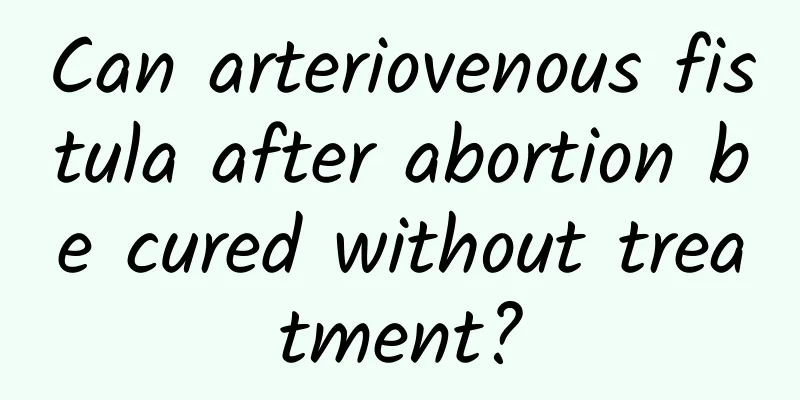Can arteriovenous fistula after abortion be cured without treatment?

|
If an AV fistula is not treated after a miscarriage, it usually does not heal on its own and can cause serious complications, so it is important to see a doctor promptly. AV fistulas are caused by an abnormal connection between an artery and a vein and can be caused by genetics, trauma, or complications after surgery. If an AV fistula is not treated, it can lead to heart failure, ruptured blood vessels, or other serious conditions. 1. Genetic and physiological factors: Arteriovenous fistula may be related to genetic factors. Some people have congenital vascular abnormalities. The fragility of one's own blood vessels is also one of the causes of the disease. For arteriovenous fistula caused by congenital or genetic factors, surgery such as vascular embolization or minimally invasive surgery is required for correction. 2. Environmental and external factors: Trauma or postoperative complications are common causes of arteriovenous fistula. Especially during abortion surgery, improper instrument operation may damage blood vessels, thus causing arteriovenous fistula. In such cases, postoperative observation is very important and regular follow-up is recommended. If arteriovenous fistula is confirmed, interventional treatment should be performed immediately. 3. Pathological factors: Arteriovenous fistula may cause abnormal blood flow, increase the burden on the heart, and lead to heart failure. If not treated in time, the fistula may expand and the risk of bleeding may increase. For this pathological arteriovenous fistula, interventional embolization, stent implantation and other methods can be used to help restore normal vascular structure and function. If you experience symptoms of arteriovenous fistula after a miscarriage, you should seek medical attention and undergo professional examination and treatment in a timely manner. Ignoring or delaying treatment may lead to serious health problems and even endanger your life. It is recommended that patients communicate with professional doctors in a timely manner, develop a suitable treatment plan, and follow up on time to ensure healthy recovery. At the same time, patients should fully understand the possible risks before surgery and choose a regular and well-qualified medical institution for surgery to reduce the risk of complications. |
<<: What are the symptoms of endometriosis that require treatment?
>>: Is there any way to prevent uterine fibroids?
Recommend
What are the warning signs of irregular menstruation?
What are the danger signs of irregular menstruati...
Why do I still have two red lines after an abortion? How long does it take for the two red lines to disappear after an abortion?
1. Why are there still two lines after an abortio...
Will girls be more active during ovulation? Reminder: 5 changes will occur in the body during ovulation
Xiaoling is one of my patients. She is 28 years o...
What are the main symptoms of chronic adnexitis?
What are the main symptoms of chronic adnexitis? ...
After the second miscarriage, I often have severe pain in my lower abdomen. What's wrong?
After the second miscarriage, I often have severe...
What medications are used to treat ovarian cysts?
What medications are used to treat ovarian cysts?...
Menopausal breast care is imperative
Menopause is a type of gynecological disease, and...
What are the common symptoms of women during menstruation?
Women have menstruation every month, and the most...
How to relieve menopausal syndrome
Menopause is a physiological stage that women mus...
What is the daily cost of treating Bartholinitis?
What is the daily treatment cost for Bartholiniti...
Preventing recurrent miscarriage in women with habitual miscarriage
It is very important for women with habitual misc...
What are the early symptoms of dysmenorrhea in women?
What are the symptoms of dysmenorrhea? What are t...
Can you eat black fungus after a miscarriage? Pay attention to the amount you eat
Can you eat fungus after a miscarriage? As we all...
What precautions should be taken before treatment of vulvar leukoplakia?
What are the precautions before the treatment of ...
Standards for testing for threatened abortion
We are all familiar with threatened abortion. Man...









